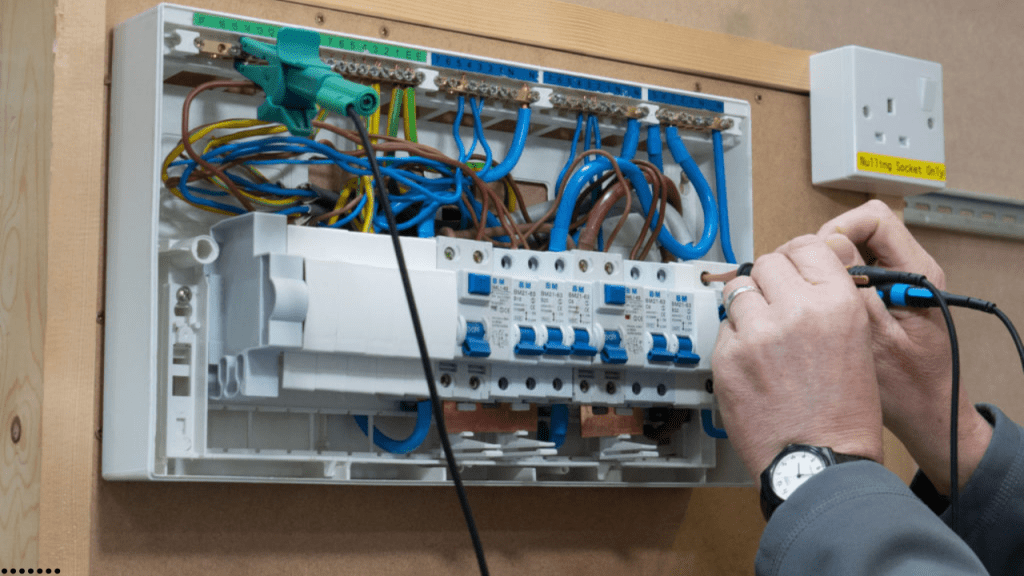The Fixed Wire Testing Regulations in the UK, as stipulated by the Electricity at Work Regulations 1989, play a critical role in ensuring the safety and compliance of electrical installations across various sectors. These regulations prescribe systematic inspections and testing intervals which are specifically tailored to the operational demands and environmental conditions of the premises involved. With the legal obligation to adhere to these standards, businesses must stay informed about the specific requirements pertinent to their operations.
Consider the implications of these regulations on businesses not only from a compliance perspective but also in terms of financial and operational impacts. How might these factors interplay to influence the broader scope of corporate responsibility and safety?
Key Takeaways
- Fixed wire testing in the UK is governed by the Electricity at Work Regulations 1989.
- Testing frequencies vary every 3 years for industrial, 5 years for commercial buildings.
- An Electrical Installation Condition Report (EICR) is used to assess electrical safety compliance.
- Non-compliance can lead to fines and invalidated insurance claims.
- Testing involves visual inspections, electrical tests, and detailed reporting for compliance.
5 year fixed wire testing Regulations
Navigating the complex landscape of fixed wire testing regulations in the UK, businesses must adhere to stringent guidelines that dictate the frequency and standards of these essential safety checks.
The UK regulations, primarily derived from the Electricity at Work Regulations 1989, mandate that all electrical installations must be maintained in a safe condition and thus require periodic inspections and testing.
The frequency of fixed wire testing varies depending on the type of installation and its use. For example, industrial sites typically require testing every three years due to higher power usage and potential safety hazards, whereas commercial environments might extend to five years. This is reflective of the presumed wear and environmental factors affecting the integrity of the electrical installation.
These standards are not merely recommendations but are enforced under UK law, with the Health and Safety Executive (HSE) overseeing compliance.
Failure to comply not only poses risks of electrical failure and safety hazards but can also lead to legal repercussions including fines and enforced closures.
Businesses must therefore engage with certified professionals who are competent to carry out such inspections.
These professionals use advanced diagnostic tools to assess wear and tear, identify defects, and ensure compliance with the latest safety standards, thus supporting the overarching aim of these regulations: ensuring electrical safety and preventing hazards.
EICR fixed wire testing
Electrical Installation Condition Reports (EICR) form a critical component of fixed wire testing, serving as a comprehensive method for assessing the safety of electrical installations in various properties.
The EICR process involves a detailed examination of a property’s electrical systems and circuits to identify any defects, deterioration, or deviations from the wiring standards defined in the UK’s national safety standard, BS 7671. This scrutiny ensures that electrical installations do not pose any potential hazards and are capable of operating safely over time.
The assessment typically covers the adequacy of earthing and bonding, the suitability of the switchgear and control gear, the serviceability of switches, sockets, and light fittings, and the integrity of the wiring system itself.
Each circuit is tested for its resistance to earth, continuity, and insulation resistance to detect any hidden flaws that could lead to electrical failures or hazards.
Upon completion, the EICR generates a report detailing any observed damage, deterioration, defects, or non-compliances.
This document not only plays a pivotal role in maintaining electrical safety compliance but also guides corrective actions and upgrades necessary to meet current electrical standards, thereby enhancing the overall safety and functionality of the property’s electrical infrastructure.
Is fixed wire testing a legal requirement
One might wonder whether fixed wire testing is mandated by law in the UK. Indeed, while no specific statute declares fixed wire testing itself a legal requirement, several regulations effectively make it indispensable for compliance with UK law.

The Electricity at Work Regulations 1989 is pivotal in this context. These regulations require that all electrical systems be maintained to prevent danger, as far as reasonably practicable. This implicitly necessitates regular testing and inspection to ensure the ongoing safety and functionality of these systems.
Further, the Health and Safety at Work etc. Act 1974 imposes a duty on employers to ensure the safety of all employees and the public who may be affected by their work activities, which includes the management of electrical risks. Compliance with this Act often involves the implementation of a fixed wire testing program as part of an overall electrical safety management strategy.
Building regulations and fire safety standards also indirectly mandate periodic electrical inspections, particularly in commercial buildings and multi-occupancy residential properties.
Failure to conduct such tests can lead to severe legal repercussions, including fines and invalidated insurance policies, highlighting the critical nature of maintaining rigorous electrical standards.
Fixed wire testing frequency HSE
Understanding the importance of maintaining compliance with UK law through regular fixed wire testing leads to the question of how frequently these inspections should occur.
The Health and Safety Executive (HSE) does not prescribe fixed intervals but stipulates that the frequency should be sufficient to prevent danger. Factors influencing the testing interval include the type of installation, its use and operation, the frequency and quality of maintenance, and the external environment.
To navigate this complexity, here are general guidelines:
- Commercial Buildings: Typically, it is recommended that inspections occur every 5 years. However, for buildings with high levels of use or that contain machinery which could degrade electrical installations more rapidly, more frequent testing might be necessary.
- Industrial Environments: Due to the potentially harsh conditions and higher electrical load demands, testing every 3 years is advisable. Special considerations might be required for areas with explosive atmospheres or extreme environmental conditions.
- Residential Accommodations: For places like rented properties, testing every 5 years, or on change of occupancy, is standard practice. Landlords are particularly advised to maintain these schedules to ensure tenant safety.
Adhering to these guidelines helps in aligning with HSE recommendations, ensuring electrical safety and compliance with UK regulations.
Fixed wire testing procedure
Fixed wire testing, a critical procedure to ensure the safety and compliance of electrical installations, involves a series of methodical assessments conducted by qualified professionals. This process is designed to meticulously evaluate the integrity and functionality of the fixed wiring within a building, including all hard-wired systems like lighting, heating, and power outlets.

The procedure begins with a visual inspection to identify any obvious signs of deterioration, damage, or non-compliance with current electrical standards. This initial phase is crucial as it helps in planning the subsequent, more detailed testing phases.
Following the visual inspection, electrical testing is performed using specialized instruments. This includes insulation resistance testing, which checks for adequate insulation to prevent electrical shocks; continuity testing, to ensure that there are no breaks in the wiring; and polarity testing, to verify that connections are correctly made and are safe to use.
Further tests include earth fault loop impedance testing and RCD (Residual Current Device) testing. These are vital for verifying the effectiveness of safety mechanisms designed to protect against electric shock and fire hazards.
The results from these tests are meticulously documented, forming an essential part of the compliance documentation required under UK law. Compliance with these procedures not only ensures safety but also the longevity and reliability of the electrical installation.
Frequently Asked Questions
Can Fixed Wire Testing Impact Insurance Premiums?
Yes, fixed wire testing can influence insurance premiums. Regular compliance with safety standards reduces risk, potentially lowering premiums due to demonstrated commitment to maintaining electrical systems and mitigating hazards associated with electrical faults.
What Are the Consequences of Not Complying With Fixed Wire Testing Regulations?
Non-compliance with fixed wire testing regulations can result in legal penalties, increased insurance costs, and potential safety hazards. It also risks operational disruptions and undermines the integrity of electrical systems, leading to costly repairs.
Are There Exemptions for Historic or Listed Buildings?
Historic or listed buildings are not generally exempt from compliance with electrical safety standards; however, modifications in testing approaches may be permitted to preserve architectural integrity while ensuring safety and regulatory adherence.
Does Fixed Wire Testing Affect Building Warranty?
Fixed wire testing generally does not affect a building warranty, as it is a safety evaluation rather than a structural alteration. However, always verify specific warranty terms with the provider to avoid potential conflicts.
How do you select a qualified fixed wire testing professional?
To select a qualified fixed wire testing professional, ensure they are certified by a recognized electrical authority and have extensive experience with compliance standards. Check references and verify their familiarity with industry-specific safety protocols.
Conclusion
In conclusion, adherence to Fixed Wire Testing regulations in the UK is crucial for ensuring electrical safety and compliance with the Electricity at Work Regulations 1989. Regular testing, as mandated by the Health and Safety Executive, prevents potential electrical hazards and legal consequences. The frequency and procedures of these tests are designed to maintain the integrity and safety of electrical installations across various premises, thereby safeguarding both human life and property from electrical risks.









